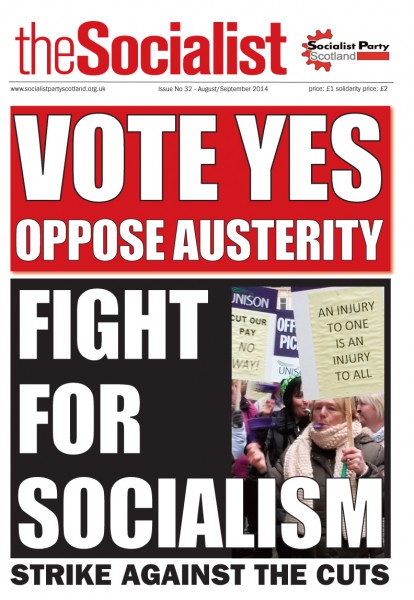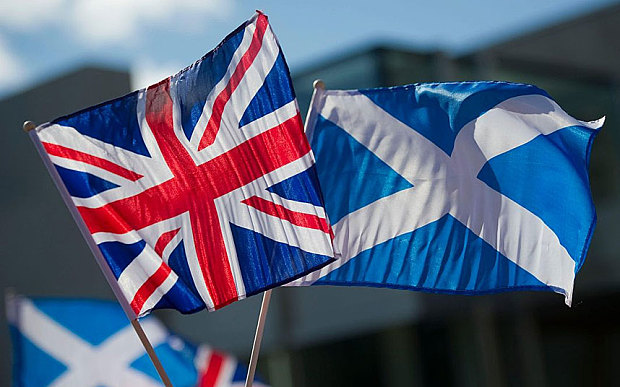Opinion polls show independence vote is balancing on a knife edge
Philip Stott, Socialist Party Scotland (CWI in Scotland)
“In the past four weeks support for the union has drained away at an astonishing rate. The Yes campaign has not just invaded No territory; it has launched a blitzkrieg.” – Peter Kellner, YouGov.
For the first time during the campaign an opinion poll has shown the Yes side ahead, in this poll by 51% to 49%. The YouGov survey for the Sunday Times, published on September 6, has sent shock waves through the capitalist political establishment in Britain.
Within hours of its publication George Osborne announced that the Tories, Labour and the LibDems had agreed a new “action plan” that would give “more powers to Scotland, tax powers, spending powers, more powers over the welfare state.”
The level of fear that is gripping the No campaign is illustrated by the fact that this panicked concession comes at a time when an estimated 500,000 people have already voted by post.
Huge miscalculation
Ironically, the SNP leadership in 2012 offered a multi-option referendum that would have included a question on more powers – a form of devolution max. This was turned down by the ConDems and Labour who arrogantly believed they could inflict a decisive defeat on the SNP and kill the threat of independence off. This colossal miscalculation has come back to haunt them with a vengeance.
As commentator and advisor to the capitalist establishment Andrew Rawnsley wrote in the Observer last weekend: “Had it been offered as a choice, I am certain there would have been a thumping majority for “devo max”. From that, I conclude this. If Scotland votes to terminate the union, a generation of Westminster politicians will have to reflect in their post-resignation memoirs on why they were so slow to see it coming and too late in shaping a response.”
Even in the event of No vote next Thursday, it’s clear that major new powers for Scotland are inevitable – demands for another referendum on independence could also follow quickly – as was the case in Quebec in the 1990’s.
A revolt against the political elite
As it is a majority vote for independence is now a distinct possibility. There is no doubt that there has been a significant swing towards Yes – especially in the working class areas of Scotland. As Socialist Party Scotland has explained many times hundreds of thousands of people see the referendum as a way to hit back at the elite politicians that are implementing austerity on behalf of big business.
The YouGov poll underlines this point. Over the last four weeks support for Yes has increased among Labour voters from 18% to 35%. For those under the age of 40, from 39% to 60% and among working class voters, it’s up from 41% to 56%. Backing for independence has increased among women and has increased from 33% to 47%.
The opportunity to vote Yes is being taken up by big sections of the working class as a weapon to hit back at the hated Westminster political elite, those responsible for benefit cuts, wage freezes and savage public sector cuts. Its become a mass revolt by the victims of austerity against their class enemy.
In the absence, temporarily, of mass action organised by the trade unions against the cuts – advocated by the Socialist Party as a vital strategy in turning the tide against austerity – the referendum has taken on a proxy form of class struggle, reflecting the huge anger and desire for economic and social change.

Mass participation
Thousands of people were queuing-up at the council offices across Scotland last week to ensure they were included in the vote as the deadline for registration approached. An estimated 300,000 voters have registered in the last two months alone. The turnout is expected to be unprecedented, at over 80%.
The legacy of Thatcherism, the criminality of the poll tax, the miners strike, mass unemployment and the destruction of communities under the Tories, all feature as driving forces for voting Yes. “This is our turn now” is a common and widely held outlook. British capitalism is paying the price for its past as well as its present crimes.
Rejection of the establishment
The Labour leaders, who are promising to implement Tory austerity if elected, are hated almost as much as the Tories. At public meeting after public meeting the anger and disgust at Ed Miliband, Alistair Darling and especially Tony Blair is ferocious. The polling evidence is also damning. 61% don’t trust what Alistair Darling – the head of Better Together – has to say. 67% distrust Ed Miliband, who fares only slightly better than David Cameron, whose levels of distrust are currently at 73%.
But nor do the leaders of the SNP inspire confidence. 58% say they don’t trust what Alex Salmond has to say. The political platform of the SNP promises to cut corporation tax for big business, seeks an austerity currency pact with the Bank of England and which implements Tory austerity when in power, means they are not seen as a party that the working class can have confidence in.
For that very reason, as Socialist Party Scotland anticipated two years ago, a huge space has opened up to the left of the SNP and the leaders of the official Yes campaign. The referendum debate has ushered in a vast interest in political ideas; how to build a “better and fairer” Scotland? How to end cuts, raise the minimum wage and defend public services?
The response to the Hope Over Fear tour with Tommy Sheridan, which Socialist Party Scotland has been playing a lead role in, has given a more concrete expression to the desire for definitive change.
The meetings that Tommy Sheridan has addressed have taken on the character of vast assemblies of an angry and energised working class. His condemnation of the capitalist establishment, that under independence the cuts should end, that the economic resources of oil and the privatised energy utilities should be publicly owned to implement a living wage and to end zero-hour contracts gains cheers and enthusiastic applause.
The point of reference that Tommy has become during the campaign is an expression of the vacuum that exists for the building of a new, fighting working class party and his role as leader of the successful mass anti-poll tax campaign in the late ‘80’s and early ‘90’s
No capitalist solution
Socialist Party Scotland also fights for the type of reforms and improvements for the working class that Tommy Sheridan rightly demands. However, we also explain, in a clear way, that in an independent capitalist Scotland austerity will not end. Indeed, that Alex Salmond and the SNP are prepared to continue with cuts after the referendum, whatever the result. Socialist policies are essential to achieve an end to austerity as we have outlined in our programme for a socialist Scotland, which we have widely distributed and articulated during the campaign.
Central to this programme is the forging of a unified working class response to capitalist austerity, not only in Scotland, but also in England, Wales and Northern Ireland as well. The class solidarity of trade unionists through a mass coordinated campaign of strike action across Britain is vital in turning the tide against the cuts and privatisation. As is the demand for the building of a new mass working class party to represent the interests of the working class majority.
The idea put forward by many on the left, including Tommy, is that it would be possible to make a transition to a fairer and socially just form of capitalism. This is summed-up in the policy of the Common Weal, which proposes the “Nordic model” of Norway, Denmark and Sweden as a template for a new, fairer Scotland.
We have replied to the Common Weal by explaining that given the scale of the economic crisis there is no possibility of sustained and long-lasting improvements for the working class today within the framework of capitalism. A mass movement of the trade unions and the wider working class needs to be built to defeat the cuts agenda, linked to a struggle to end capitalism by introducing decisive socialist policies.
A return to the unprecedented post-second world war economic upswing that the social democratic Nordic model was built on is not possible. Today, capitalism is attempting to drive through an eradication of the past gains made by the working class, including in the Nordic countries.
What next?
With 10 days to go until voting begins, the outcome of the referendum sits on a knife-edge. The consequences of a Yes majority for the British capitalist elite would be colossal and unprecedented and would have far-reaching consequences. Cameron could be forced to resign and the Tories tipped into a crisis, accelerating a possible split away towards Ukip. As political commentator Martin Kettle wrote in Monday 7th September in the Guardian newspaper: “This weekend the unthinkable has elbowed its way into the driving seat of British politics. No other issue now matters in British politics. These may not be the 10 days that will shake the world as John Reed called the Russian revolution. But they will be 10 days that could change all our lives, shaking the British state and it’s people to their very foundations.”
In order to avoid this disaster for them further concessions on powers will be forthcoming from the capitalist establishment. Project Fear will also be ratcheted up again in the run-up to next Thursday. The Queen has let it be known that she is “horrified” about the polls and “concerned” about her constitutional position if there is a Yes vote. A UK military intervention into Syria and Iraq may also take place before the 18th September, which could also have an impact on the vote. Dire warnings about the threat of financial meltdown and the collapse of the economy will also continue.
The Labour party would be thrown into a crisis following a Yes vote. As Paul Mason commented: “If, on the morning of 19 September, we wake up and that 4/1 horse of independence has come in, the levels of shock in official circles will be extreme. Even more traumatised will be Labour. The prospect of a majority Labour government at Westminster after 2016 will be remote.”
In reality, if Labour were to adopt a fighting socialist programme and offer a clear alternative to continued austerity they would win a majority at Westminster – even without Scottish Labour MPs. It’s Miliband’s and Ball’s slavish adherence to capitalist policies and the Tories spending plans that are undermining the changes of a majority Labour government. Which is why the trade unions should lead moves to build a new mass workers party as a matter of urgency.
Team Scotland
The SNP leadership are already moving to try to include leading Labour figures like Alister Darling and Johann Lamont into “Team Scotland”, as well as LibDem’s and Tories. This is the body that would lead the negotiations with the UK government on the independence settlement. This is part of an attempt by the SNP to dampen down the aroused expectations of big sections of the working class in Scotland who will demand real and fundamental change post referendum.
Socialists and trade unionists should oppose the approach of leaving such vital talks on issues like the currency and what powers an independent Scotland would have to pro-cuts politicians. Instead we would demand democratic elections to a negotiating body, open to all, including the standing of trade union and socialist candidates that would take the independent class demands of the working class into the talks. For example, to demand a return of the over £4 billion stolen from public services in Scotland as a result of Tory austerity policies since 2010.
Whatever the outcome of the referendum the demand for not another penny of Westminster cuts is likely to grow. Up to two million people will have voted Yes to independence seeking an end to austerity and falling incomes. Yet it’s clear that the SNP leadership are preparing to carry on with the cuts – a further £3 billion in the next two years. The trade unions should immediately call for an end to all cuts in Scotland, linked to a mass campaign of generalised and coordinated strike action against austerity.
Build on the potential
There is an urgent need to build on the huge potential that we have seen during the referendum among hundreds of thousands of working class people seeking a way out of capitalist austerity. The working class response to the Hope Over Fear tour and the re-emergence of Tommy Sheridan as a major figure should be built on to help provide a stronger political voice for socialism following the referendum.
Socialist Party Scotland has helped to initiate a Scottish Trade Unionist and Socialist Coalition conference on 1st November in Glasgow, aimed at bringing together all those seeking to build a working class, anti-cuts and socialist electoral alternative.
In the wake of a Yes vote there may be moves to establish a new left party or coalition from some of the pro-independence forces. This could be initiated by some of the leading elements in the Radical Independence Campaign and some of the academics around the Common Weal. However, were it to be based on the Common Weal’s programme – and it’s likely lack of a working class orientation – there is no certainty that this would automatically be a step forward in resolving the lack of working class political representation.
Whatever the outcome of the vote next Thursday, the political terrain will have changed decisively in Scotland. The urgent task of capitalising and channelling the colossal anger that has been so evident into a mass struggle to defeat the cuts agenda and to strengthen the ideas of socialism in Scotland will need to be stepped-up on 19 September.
Socialist Party Scotland is supporting a Yes vote and that the powers of independence be used to:
- Nationalise, under democratic workers’ control and management, the oil and gas industry, the renewable energy sector and the major sectors of the Scottish economy. This would release billions to invest in a massive programme of job creation and to rebuild our public services.
- Bring the banks and finance sector into public ownership under democratic working class control.
- Renationalise gas, electricity, transport and the privatised sectors of the economy.
- Tax the rich and big business. Increase the minimum wage and end the attacks on welfare.
- For a living wage and an end to zero-hour contracts.
- No to Nato. Trident and all weapons of mass destruction out of Scotland. Invest in socially useful jobs.
- Abolish all anti-trade union laws.
- Trade unions should break from Labour and build a new mass working class party.
- Reverse the cuts. For a Scottish government representing working people, the unemployed and the poor that defends jobs, wages, public services and pensions and refuses to make cuts to pay for the crisis.
- For a socialist plan of production in an independent socialist Scotland as part of a voluntary confederation with England, Wales and Ireland as a step to a socialist Europe.




